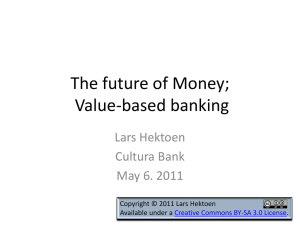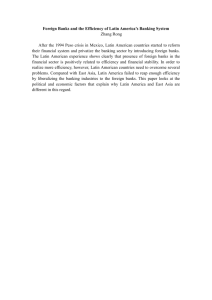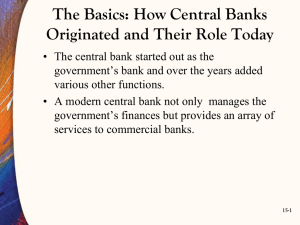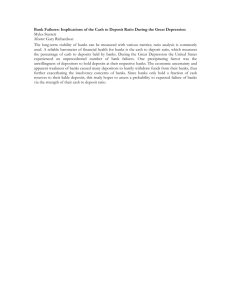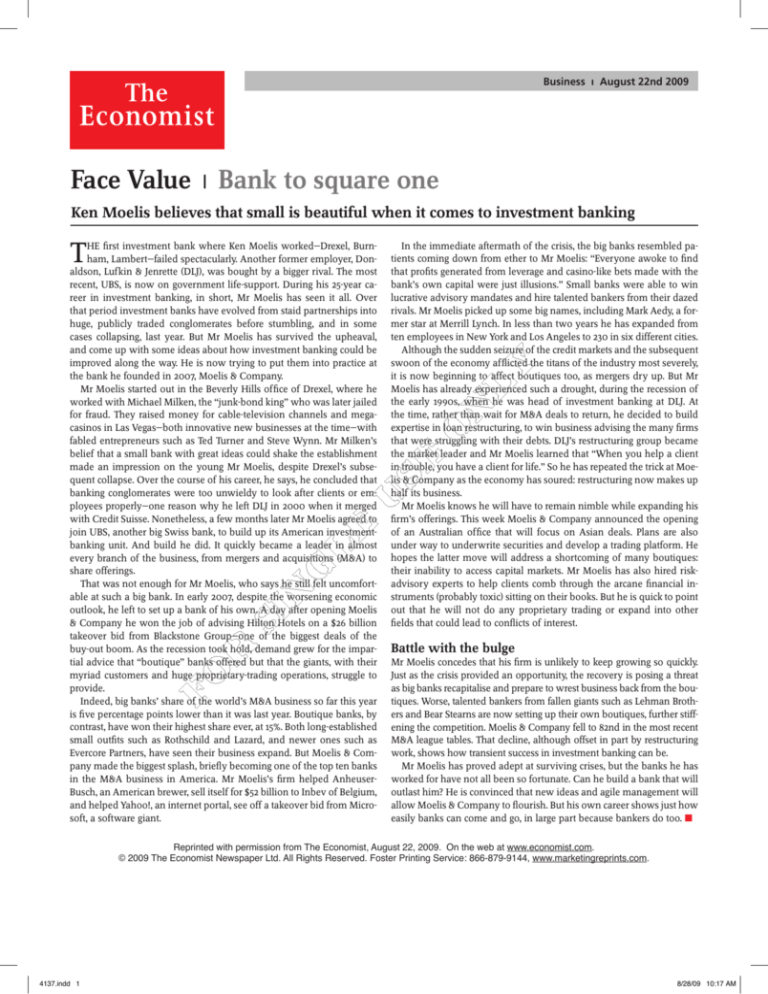
Business ı August 22nd 2009
Face Value ı Bank to square one
Ken Moelis believes that small is beautiful when it comes to investment banking
T
HE first investment bank where Ken Moelis worked—Drexel, Burnham, Lambert—failed spectacularly. Another former employer, Donaldson, Lufkin & Jenrette (DLJ), was bought by a bigger rival. The most
recent, UBS, is now on government life-support. During his 25-year career in investment banking, in short, Mr Moelis has seen it all. Over
that period investment banks have evolved from staid partnerships into
huge, publicly traded conglomerates before stumbling, and in some
cases collapsing, last year. But Mr Moelis has survived the upheaval,
and come up with some ideas about how investment banking could be
improved along the way. He is now trying to put them into practice at
the bank he founded in 2007, Moelis & Company.
Mr Moelis started out in the Beverly Hills office of Drexel, where he
worked with Michael Milken, the “junk-bond king” who was later jailed
for fraud. They raised money for cable-television channels and megacasinos in Las Vegas—both innovative new businesses at the time—with
fabled entrepreneurs such as Ted Turner and Steve Wynn. Mr Milken’s
belief that a small bank with great ideas could shake the establishment
made an impression on the young Mr Moelis, despite Drexel’s subsequent collapse. Over the course of his career, he says, he concluded that
banking conglomerates were too unwieldy to look after clients or employees properly—one reason why he left DLJ in 2000 when it merged
with Credit Suisse. Nonetheless, a few months later Mr Moelis agreed to
join UBS, another big Swiss bank, to build up its American investmentbanking unit. And build he did. It quickly became a leader in almost
every branch of the business, from mergers and acquisitions (M&A) to
share offerings.
That was not enough for Mr Moelis, who says he still felt uncomfortable at such a big bank. In early 2007, despite the worsening economic
outlook, he left to set up a bank of his own. A day after opening Moelis
& Company he won the job of advising Hilton Hotels on a $26 billion
takeover bid from Blackstone Group—one of the biggest deals of the
buy-out boom. As the recession took hold, demand grew for the impartial advice that “boutique” banks offered but that the giants, with their
myriad customers and huge proprietary-trading operations, struggle to
provide.
Indeed, big banks’ share of the world’s M&A business so far this year
is five percentage points lower than it was last year. Boutique banks, by
contrast, have won their highest share ever, at 15%. Both long-established
small outfits such as Rothschild and Lazard, and newer ones such as
Evercore Partners, have seen their business expand. But Moelis & Company made the biggest splash, briefly becoming one of the top ten banks
in the M&A business in America. Mr Moelis’s firm helped AnheuserBusch, an American brewer, sell itself for $52 billion to Inbev of Belgium,
and helped Yahoo!, an internet portal, see off a takeover bid from Microsoft, a software giant.
In the immediate aftermath of the crisis, the big banks resembled patients coming down from ether to Mr Moelis: “Everyone awoke to find
that profits generated from leverage and casino-like bets made with the
bank’s own capital were just illusions.” Small banks were able to win
lucrative advisory mandates and hire talented bankers from their dazed
rivals. Mr Moelis picked up some big names, including Mark Aedy, a former star at Merrill Lynch. In less than two years he has expanded from
ten employees in New York and Los Angeles to 230 in six different cities.
Although the sudden seizure of the credit markets and the subsequent
swoon of the economy afflicted the titans of the industry most severely,
it is now beginning to affect boutiques too, as mergers dry up. But Mr
Moelis has already experienced such a drought, during the recession of
the early 1990s, when he was head of investment banking at DLJ. At
the time, rather than wait for M&A deals to return, he decided to build
expertise in loan restructuring, to win business advising the many firms
that were struggling with their debts. DLJ’s restructuring group became
the market leader and Mr Moelis learned that “When you help a client
in trouble, you have a client for life.” So he has repeated the trick at Moelis & Company as the economy has soured: restructuring now makes up
half its business.
Mr Moelis knows he will have to remain nimble while expanding his
firm’s offerings. This week Moelis & Company announced the opening
of an Australian office that will focus on Asian deals. Plans are also
under way to underwrite securities and develop a trading platform. He
hopes the latter move will address a shortcoming of many boutiques:
their inability to access capital markets. Mr Moelis has also hired riskadvisory experts to help clients comb through the arcane financial instruments (probably toxic) sitting on their books. But he is quick to point
out that he will not do any proprietary trading or expand into other
fields that could lead to conflicts of interest.
Battle with the bulge
Mr Moelis concedes that his firm is unlikely to keep growing so quickly.
Just as the crisis provided an opportunity, the recovery is posing a threat
as big banks recapitalise and prepare to wrest business back from the boutiques. Worse, talented bankers from fallen giants such as Lehman Brothers and Bear Stearns are now setting up their own boutiques, further stiffening the competition. Moelis & Company fell to 82nd in the most recent
M&A league tables. That decline, although offset in part by restructuring
work, shows how transient success in investment banking can be.
Mr Moelis has proved adept at surviving crises, but the banks he has
worked for have not all been so fortunate. Can he build a bank that will
outlast him? He is convinced that new ideas and agile management will
allow Moelis & Company to flourish. But his own career shows just how
easily banks can come and go, in large part because bankers do too. n
Reprinted with permission from The Economist, August 22, 2009. On the web at www.economist.com.
© 2009 The Economist Newspaper Ltd. All Rights Reserved. Foster Printing Service: 866-879-9144, www.marketingreprints.com.
4137.indd 1
8/28/09 10:17 AM




